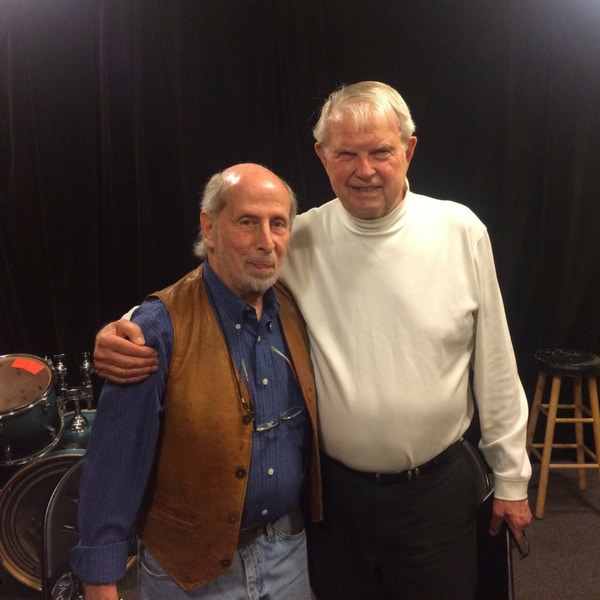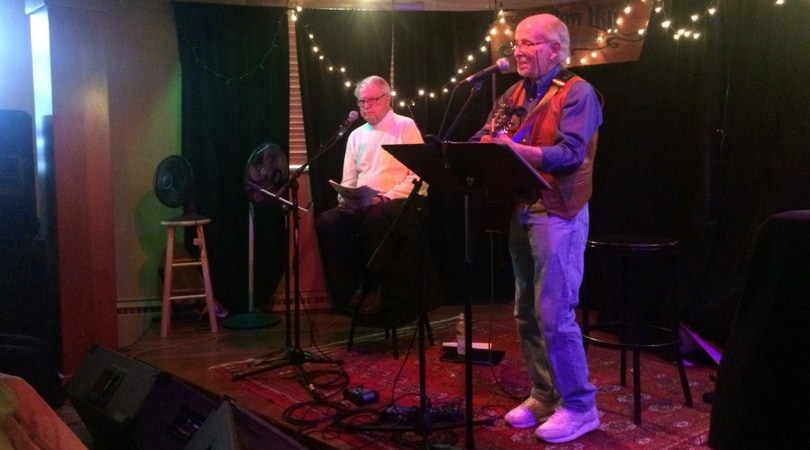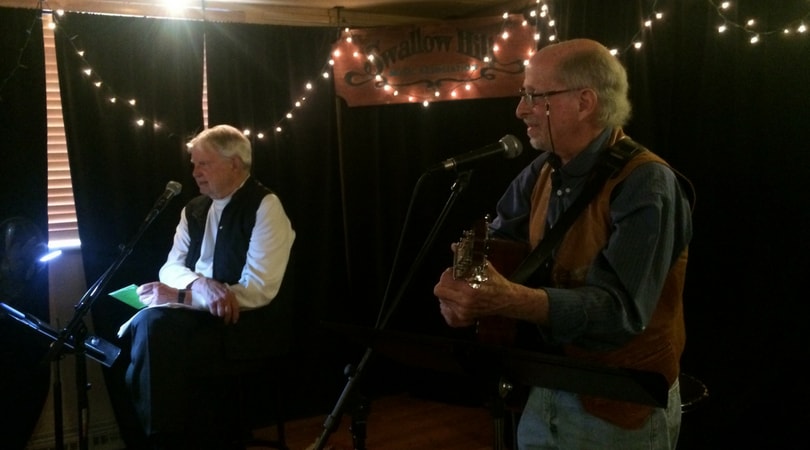
Denver folk music legend Harry Tuft, left, and former Colorado Governor Dick Lamm at Swallow Hill Music on Thursday, May 17, 2018.
“So many great adventures, and we’re not done yet,” Dick says with a glint in his eye.
“You betcha,” Harry replies.
The Dick and Harry in question are former Colorado Governor Richard Lamm, and Harry is Denver folk music legend Harry Tuft.
The longtime friends are catching up over dinner at Colore Italian Restaurant and Pizzeria before taking the stage in Quinlan Cafe at Swallow Hill. The two exude a brother-like camaraderie, even finishing each other’s sentences.
They first joined forces for a “Bury Goldwater” hootenanny in 1964 in support of LBJ, little could they imagine where it would lead them.
At the time, Dick was President of the Denver Chapter of the Young Democrats, and Harry was cutting his teeth as founder of the Denver Folklore Center.
The hoot took place at the Carpenters Union hall which stood at 20th and Lincoln and seated 400. The evening featured a speech by George Brown, some gospel groups, a jugband, a folkie protester type, and some others. “It was just an entertaining fundraiser” that was light on the politics despite the occasion, Harry recalls.
It was probably one of the most successful things I did,” he adds, still proud of the sold out event. “And certainly one I enjoyed more than a whole lot of others.”
“Right,” Dick chimes in with a laugh.
A few years later when Harry needed someone to help him bring The Mamas & The Papas to Denver, he turned to Dick to co-sign for a $5,000 deposit, “which is money I did not have,” Harry explains.
“I was sweating bullets,” Dick recalled, “because tickets were not selling.”
Fortunately for the friends, some last minute national attention turned the anemic presales into a sold out and highly profitable concert.
“The thing about it,” Harry says to Dick, “is that you had no idea who The Mamas & The Papas were.”
“That certainly is true, I sure had no idea,” Dick confirms with another chuckle.
Dick put his share of the profits into his rising political career. “And I used my half to stay out of bankruptcy,” Harry adds.
“So, you would not believe,” Dick interjects. “These Mamas and Papas at the after show party were smoking these funny cigarettes – I’d never seen them before.”
“I deny any knowledge of that,” Harry quips.
Before too long, the pair found themselves performing together. A voracious reader, Dick would share pieces of poetry and prose, while Harry complimented the by playing his guitar and getting the audience to sing along.
“The performance we do came about when there was some sort of fundraiser for the Young Dems, and then from time to time we’ve just done it.” Harry explains. “We probably have a couple of hours worth of material” to choose from.
When asked about the role of music in politically turbulent, be it now or the 1960s, Harry says “I think people still respond in the way that you would imagine, as universal as music is.”
He pauses for a moment, and then he says “Think of music in this way – if our society is a wall, and if the bricks are people, then music is the mortar. It’s the thing that really does pull people together and hopefully lift people up.”
After some prompting from Dick to talk specifically about the tradition of protest in music, Harry concludes by saying “When people don’t like things and there’s nothing much they can say about it, sometimes they sing about it.”
“That’s correct,” Dick says with a nod of approval.
—

Former Colorado Governor Dick Lamm, left, and Harry Tuft share prose and music in Quinlan Cafe at Swallow Hill Music on Thursday, May 17, 2018.
About an hour later Dick and Harry take their places on the stage in a sold out Quinlan Cafe.
“You ‘Californicated’ Colorado early,” Harry jokes after Dick explains he moved to Colorado in the early 1960s after realizing California wasn’t for him.
The informal banter quickly gives way to performance, though. The show moves briskly with Dick and Harry alternating between readings and music like a well-oiled double play combo.
Dick’s readings cover the impermanence of our lives and the vastness of time. He pulls these themes together into a discussion of the moral duty we all have to treat people and the earth with dignity, as if to say despite the distance of time, we will leave a record of our actions here.
His selections range from folk tales and speeches to natural history, to poems such as “Resumé” by Dorothy Parker and “Lament for a Wavering Viewpoint” by Phyllis McGinley. Harry responds with songs like “When I’m 64” by The Beatles, and Ralph McTell’s “Streets of London.”
Onstage, Dick plays the stoic – or at least he tries to. During Harry’s rendition of Bob Dylan’s “When The Ship Comes In,” though, he cracks a broad smile when the audience sings along. A few moments later his voice cracks in sorrow during a reading; no matter how many times he’s covered this ground, he still connects with the material on a gut level.
“You guys sound great tonight,” Harry says after leading the audience in singing the 1960s peace anthem “Get Together,” which was made famous by The Youngbloods
It is easy to imagine these two friends swapping wisdom and laughter and tears deep into the night, but all good things must come to an end.
In the show’s closing minutes they trade passages from Kathrine Taylor’s haunting short story Address Unknown. The story details, in fictitious letters, a German gentile’s descent into Nazism in the 1930s and his betrayal of his Jewish friends.
The reading leaves the room in silence and Harry let’s everyone sit with it for a moment before he starts in on a pointed cover of Leonard Cohen’s “Hallelujah.” His rendition gives the song a march-like cadence to which he lends his unwavering voice. By the final chorus the audience has joined him in sending a spirit of hopefulness into the night.
